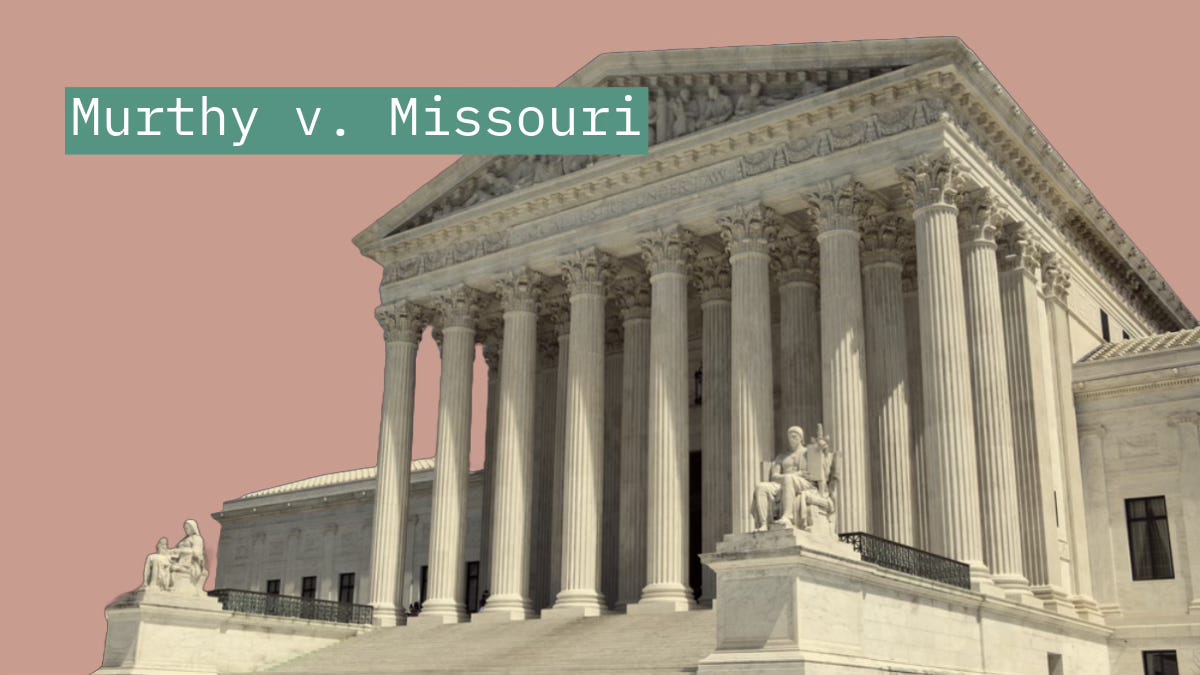Supreme Conservatism
No, the other type of conservatism.
It's Supreme Season, that time of year when the Supreme Court ends its term and releases its big rulings. Since those rulings can have seismic consequences, court watchers such as myself spend these few weeks with bated breath and a mix of anticipation and dread.
Sometimes, we liberty lovers get good news.
Other times, not so much.
Regular readers may recall this bit from April about free speech and the government's efforts to muzzle it, wherein I mentioned Murthy v Missouri. That case, about government coordinating with and putting "soft coercion" on social media companies, was just ruled upon.
In what's being hailed as a big win for the Biden administration, the court... punted. In a 6-3 ruling, it ruled that the plaintiffs did not have standing to challenge the government's censorious behavior. As in, they could not prove they were "injured."
Even though Amy Coney Barrett wrote the majority opinion, this case has the all hallmarks of Chief Justice John Roberts. Roberts has taken a very "conservative" - as in, be reticent to rock the boat and deferential to the other branches as possible - approach to running SCOTUS. Supposedly, in order to preserve the Court's reputation.
Fat lot of good that effort has done. The Left, infuriated by the supposed ideological shift of the Court perpetrated by Trump (they're infuriated by all things Trump, of course, facts or merits aside), has been waging rhetorical war on both the Court as a whole and on individual Justices. Now, the Right is screaming "betrayal," with various calumnies aimed at Barrett and Kavanaugh, who voted with Roberts and the three left-leaning Justices to let the government continue to muzzle our speech and choose our opinions for us.
I'm not a lawyer, and certainly no expert on "standing," but I do understand the concept enough to wonder whether we are looking at a situation where the government has figured out how to do unconstitutional things that can't be challenged in court. Whether they've learned how to game the system and rules-lawyer the game so that the third branch of a supposedly co-equal tripartite government has been declawed.
One old gag in the political sandbox is to call a judge or court "activist" when they do something we don't like, with "activist" being a pejorative. Doing your job is not, however, "activism." The Supreme Court's role can be boiled down to saying "no" to the other branches of government when they overstep the boundaries set by the Constitution.
If the Court won't do that for arguably the most important right we citizens have protected by the supreme law of the land, what good is it?
Recently, an Internet friend and regular reader asked me to ponder how I'd feel if the Court ruled on another matter in a way that ran counter to my interpretation of a different Constitutional protection. I found that an odd question, and a (likely unintentional) appeal-to-authority. The Court has made decisions I disagree with - decisions I have no reservation in calling "bad" or "terrible."
While Murthy isn't an overt endorsement of government censorship and speech-control, it will take years for another challenge to the behavior to wend its way through the courts. Certainly, the current government censorship apparatus will continue, unchecked and emboldened. And, the social media companies that might have thought about being more resistant to the Administration's meddling and overtures in the wake of all the public has learned, are more apt to play along. Especially since many of them are infused with partisans who are all too happy to help tip the election toward Biden.
The Murthy decision falls into the "terrible" category. It's a dereliction of duty, one that will reverberate for quite some time. Roberts' desire to preserve the Court's reputation has once again gotten in the way of the Court doing its job.



"If the Court won't do that for arguably the most important right we citizens have protected by the supreme law of the land, what good is it?" An alarming thought. For the first time I felt that the Supremes made a cowardly and costly punt.
I would first note the conservative/libertarian response: disappointed, angry even - but not "burn it down!" when we lose. And this was a key case, make no mistake. But I think it will be back, the underlying case is still alive and before a district court. More importantly, the House is now watching and can continue to make those corrupt agencies' lives a living hell. And they've signaled precisely that.